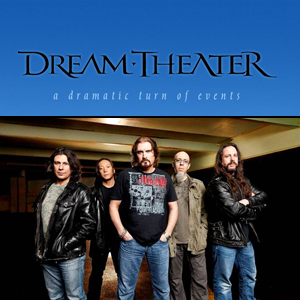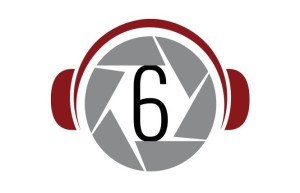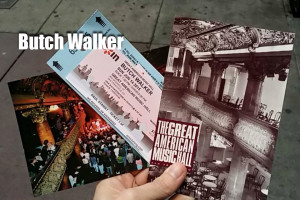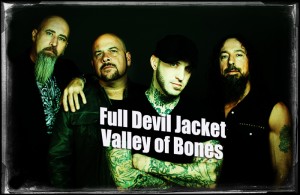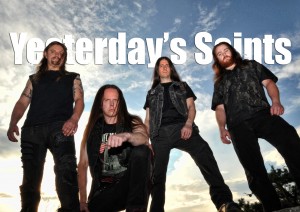The Rise of the South: A Conversation with The Civil Wars
22 min read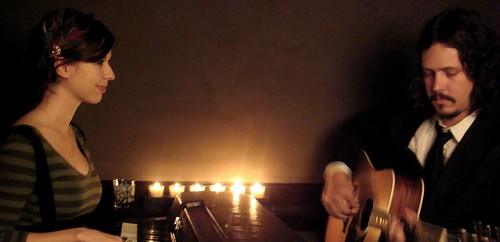
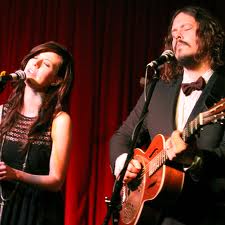 I’ve only been listening to The Civil Wars for a few weeks. When I was first introduced to their music, I will admit that I wasn’t impressed with the idea of a Folk/Americana duo hell bent on playing music that required that the listener come up for air once the music was finished. After all, who wants to be sad? But there’s a big difference between playing music that is intentionally sad and playing music that is sad as a result of the absence of happiness or love or affection for that matter. There’s just something that resonates within our spirit when music just seems to perfectly capture ideas of longing, of unrequited love and of the distance between having and not having. It’s the kind of music that really has its hand on the pulse of what it means to be a living and breathing creature on this sometimes lonely planet. No, it isn’t very often that a duo like this comes around. And it’s even rarer that any group can capture your attention from start to finish with not much more than a guitar and their voices. But The Civil Wars are the type of group that plays just the right combination of melancholy and hopefulness that steals your breath away until you find yourself gasping for air when the music is done. But when the music fades, they leave us with a single idea that reminds us that you don’t have to say “I love you” in order to write the perfect love song.
I’ve only been listening to The Civil Wars for a few weeks. When I was first introduced to their music, I will admit that I wasn’t impressed with the idea of a Folk/Americana duo hell bent on playing music that required that the listener come up for air once the music was finished. After all, who wants to be sad? But there’s a big difference between playing music that is intentionally sad and playing music that is sad as a result of the absence of happiness or love or affection for that matter. There’s just something that resonates within our spirit when music just seems to perfectly capture ideas of longing, of unrequited love and of the distance between having and not having. It’s the kind of music that really has its hand on the pulse of what it means to be a living and breathing creature on this sometimes lonely planet. No, it isn’t very often that a duo like this comes around. And it’s even rarer that any group can capture your attention from start to finish with not much more than a guitar and their voices. But The Civil Wars are the type of group that plays just the right combination of melancholy and hopefulness that steals your breath away until you find yourself gasping for air when the music is done. But when the music fades, they leave us with a single idea that reminds us that you don’t have to say “I love you” in order to write the perfect love song.
I had the opportunity to talk to Joy Williams and John Paul White of the Civil Wars recently. All of us were in the midst of hectic scheduling while juggling jobs, child care and sick children. Despite it all we still managed to have a great talk on what makes this band so special. Check it out.
C6M: I just listened to the album and I’m very excited to talk a little bit about it but before we do, I wanted you guys to talk a little bit about the formation of your duo and how you two met and what prompted you to start writing music together?
Joy Williams: I definitely can speak from my end that there was no intention of ever forming a duo with anybody until I met John Paul, and even then it was just sort of Nashville slow burn that happened. We ended up meeting at a writer’s gathering in Nashville. Several writers were sort of called together to write for one particular band that needed radio singles. And at the time, John Paul and I were both full-time songwriters, on top of doing some solo music. And we literally drew straws basically to see what writers would go in what rooms, and John Paul and I being perfect strangers, we’re two of three people that got picked to go into one room, and yeah, it was just this instant connection musically and I just knew where he was going when he was singing, and it seemed the same for him. I don’t know, John Paul, what would you say to that?
John Paul White: Well, one thing you said that I was definitely going to second is that we had absolutely no intentions of forming any kind of collaboration, band or duo or otherwise, and I think in my experience it’s kind of been the way that the best relationships I’ve ever had were formed, and they’re just kind of like with any other sort of relationship, if you’re looking for something, you typically will find something close to it and just try to compromise and make it work. And with us, neither one of us had any aspirations of doing anything other than the solo thing, so it was just like we kind of got hit like a ton of bricks. Alright, alright, sorry. Okay, I should give a disclaimer here. My phone has a really short chord and it’s dying, and the only chord I have is next to my son playing Wii.
[Laughter]
John Paul White: So, you’re going to hear the Last Airbender kicking ass in the background.
Joy Williams: This is so perfect.
C6M: Yeah, and if you hear anything on my end too, it’s my kid, so just letting you know.
Joy Williams: How many kids do you have?
C6M: I have two, and one of them is sick today, so it’s sort of put a whole new spin on how to do this, to get through my day working from home.
John Paul White: Well dude, I’m right there with you. We spent the entire evening being thrown up on. So…
C6M: Awesome.
John Paul White: By two — a four month old and a three year old. So, it’s — yeah, we’re in quarantine down here.
Joy Williams: I’m feeling for both of you really bad right now.
John Paul White: Oh yeah, it’s all good, it comes with the territory.
C6M: Absolutely. So, getting back to the story – you had no intentions and you got kind of thrown in together, sort of the “Put my chocolate in my peanut butter and peanut butter in my chocolate” and you put it together.
John Paul White: Pretty much.
C6M: So, what’s the typical dynamic like? Is one person more of a lyricist or you’re both equal partners in that you come up with the music together as you sort of jam in together, or how does that work?
John Paul White: It’s pretty much on any given day, the dynamic changes. It feels like a balance, 50-50, a collaboration as it could possibly be. I know that’s probably not the exciting answer I could give, but Joy has an amazing sense of melody and plays piano, and then I come at it from a guitar standpoint and we both have been solo singers for quite a while, so we have a lot of the same strengths and weaknesses, and somehow on each given day we kind of lock up. We’ve been extremely lucky that we’ve been really prolific, that when we do sit down, I don’t know if it’s because we know that we only have a finite amount of time together, seeing as how we live two and half hours away…
Joy Williams: Hours away, yeah, yup.
John Paul White: ..from each other. So, time is of the essence, and every time we sat down, we’ve pretty much, other than maybe a couple of times — it’s been some times that we’ve either recorded and released or will be released on this record or soon to be, so we’re really lucky in that sense. That same dynamic seems to happen live as well, which is really enjoyable, I think, for both of us having been solo artists, been used to sort of — been more of a focal point, it’s really great to have somebody that is — that you feel very equal with on stage to share music, to share the dynamic, to share the stories, to share the light together, just create — it’s really enjoyable. I always keep thinking myself too, because it really was that we sort of happened to fall into it, into making music together. So, yeah, every time that we spent on stage or every time we sit down to write, we never assume that anything — and I think we just never assumed that like one or the other is going to take the lead, it’s just the matter of being together, and that’s actually creating a different dynamic than we could create as individuals on our own.
C6M: Well, I noticed that you guys seem to laugh a lot, so how important does having a sense of humor come into play working together, because I know this, at the beginning of your Live at Eddie’s Attic album, it kicks off with that interesting little joke, if you will, about how if you’re not sad now, you’re going to be, and everyone laughs and I found it very humorous, because the rest of the album definitely does take a somber tone to it. So, how important is the humor than in performing music that is ultimately giving you a whole different feel?
John Paul White: The Eddie’s Attic show was the second show we’d ever played, and so we learned after the first show, which was in Nashville, to friends and family basically, and we figured out at the end of it — I don’t think we actually had to say it out loud, but it was like…”Holy crap, that was really heavy.” The material that we write typically, has a pretty heavy tone to it, whether it be positive or negative, there’s a — I feel like we try to convey a lot of weight to what we’re saying. And by the end of the night, even I was pretty overwhelmed. So, I think it was just an unconscious decision, that things — we had to — like she said, let people come up for air, and including ourselves, and so it’s become like — it’s just up and down, up and down with each song we just kind of write. But what we do on stage is what we do off stage. I mean we just…
Joy Williams: I was just going to say that. That’s like you’re getting like what we’re like when we hang at the bar, you’re getting what we’re like when we’re writing in my living room. I mean you are getting the living room experience, because I think we’re letting it sort of all just be there.
John Paul White: It’s a little less vulgar on my part when we’re on stage, but…
[Laughter]
Joy Williams: That is so true. Oh my gosh, I cannot stress how true that is.
John Paul White: Yeah, you get a version of us at least.
C6M: You guys certainly nail sadness, melancholy, you have this sense of capturing the Blues, all rolled up into like an Americana/Folk Music.
John Paul White: Pretty much.
Joy Williams: Yeah.
C6M: I think that’s part of what resonates with these songs though, is that it very much taps into — at least for me, it hit me up at the right time, in the current climate as Americans. I was sitting there and I was listening to this and I felt like you had your hand on the pulse of our culture in a lot of ways, past and present. Was that intentional when you were creating the music or is that just something that was an unintentional byproduct?
Joy Williams: Wow. What you just said is really awesome, and I feel kind of overwhelmed by how — I feel like that’s really undeserving but it’s awesome that you feel that way about the music. I don’t think — again like, John Paul and I continually sort of laugh at the fact that a lot of what we do is sort of following the muse and following the stories that are happening in our own lives, and as we’re a part of the culture and a part of what’s happening right now, I think that that just sort of quietly oozes and seeps into the music, but it’s not an intentional sort of like let’s make sure that we cover these particular emotions or these particular events that are happening. But we do — I mean we have — I remember writing this song on the day that Obama was officially in office, and being sworn in, and somehow that made its way subconsciously into a song that we ended up writing, though you can’t actually tell it. But I feel like I’m blabbing, what would you say to that John Paul?
John Paul White: I thought you were doing great. I thought that was great, I could have listened all day.
Joy Williams: Yeah, I’ll tell you later. Thanks.
John Paul White: I think that’s the testament to doing the collaborative thing, is that what we do doesn’t become intensely personal to one person, and that tends to bother me sometimes listening to solo artists, is that it becomes all about them and about their hardships. And I think because we have the two of us coming at things from a different angle, not only from the female-male perspective, but she’s married, I’m married, two different people, and we live in totally different — even though we’re both in the south, it’s really different where we live. And so we bring all of these things to the table, and so some sort of generality comes out of all of that, and maybe that’s it. Maybe that’s why we’re tapping into it, but like she said, we really, really try not to think about it and just let it fall out and say what I like to hear, and here it is.
C6M: Well, it’s really interesting that you touched upon coming from two different places.That’s sort of what I noticed as I was listening to the music and while we’re on the subject of the music itself, there’s a lot of juxtaposing ideas and imagery. One of my favorite lyrics that I — I’ve only had the opportunity to listen to this album for a couple of days, but one of my favorite lyrics that struck me was “Swan dive down, 11 stories high, hold your breath until you see the light,” and then “Don’t go without me, c’est la vie c’est la mort.” I thought it was brilliant, because there is this sense of — again, getting back to what you guys were thinking a little bit, but there is a sense of encompassing loss and pain and all this stuff, but the interesting thing is that there is the opposite emotion that you seem to try to play at the same time, because if you have pain and loss, there’s also a sense of you must have loved once or you must have been there. When you’re in that writing process, are you guys playing that back and forth saying, “What about this and what about that and should we?” How does that play into your creating — when you actually sit down to create?
John Paul White: I think we most definitely do that. I think we sit back and we decide, “Alright, is this just too maudlin? Is this going one way, way too far? Is there any — does it need a breath of fresh air?” There’s songs like “Falling” that really never allude to things being better, they allude to things needing to end.
Joy Williams: Yeah.
John Paul White: But you know, sometimes there is hope in that, where you finally decide, “Alright, it’s time to move on and things are going to be better.” That’s my idea of a great love song, a song that says “Everything in the world sucks except you.” It might not be a positive love song, but that’s my ideal. Everything’s awful.
[Laughter]
Joy Williams: I think you’re right. I think like John Paul was talking about in terms of bringing the different perspectives, whether it’s male or female or our own stories which are quite varied, but between the two of us, I think bringing each of the stories together, sort of does make it a “choice.” And I think a lot of what we write about is not really about tension, that every time you say yes to something, you’re saying no to something else, and every time you’re choosing one person, you’re saying “I don’t choose all the rest of you,” and I think that that’s something that inadvertently I think John Paul and I both are keenly aware of in our own lives, and that translates into music too. Like you said, if there’s — if we’ve experienced loss, we’ve also — it’s because we’ve felt emotion and loved somebody, and I think that it’s great that people are able to pick that up. It encourages me that you can pick that up, because we don’t want to be dark just to be dark, and we don’t want to be — we don’t want to betray. We want to write about things that are real. And so much of what life is about, is about those small battles every day. It’s about the tension that we all sort of walk in every single day. So, to write about that only seems natural, I think, to both of us.
C6M: Well, I definitely feel that that’s kind of what country music to some extent sort had a bad rap for, that you lose everything in a country song or whatever.
John Paul White: Sure.
C6M: But the reality though of that is that it speaks a lot of truth. You don’t have to have — I personally don’t think that you have to have a love song that directly says I love you. It could speak of all of the moments where you love someone and they’re no longer there or something like that, at least, that’s my impression of your music in particular. Getting back to that – that’s what I loved, and I would argue that half of the songs that you created on Barton Hollow were love songs in some sense, even if you didn’t directly say it.
John Paul White: I would totally agree with that, I would totally agree with that.
Joy Williams: Yeah.
John Paul White: I think the parameters that people put around a love song are kind of ridiculous and myopic. I mean there are so many different ways to look at it and so many different — so many different viewpoints, but thanks man. To only have the album a couple of days man, it’s pretty amazing. Thank you very much.
C6M: You’re welcome. Okay, let’s talk a little bit about the name of your group. How did you come up with a name like Civil Wars?
Joy Williams: It was…
John Paul White: Well, I wanted it to be The Korean War, but she wouldn’t go for it.
[Laughter]
Joy Williams: Oh my gosh. Are you done or are you going to keep going?
John Paul White: No. Can you imagine the touring things that we could do with that? Come on.
Joy Williams: You can still go with it.
John Paul White: Not right now, not right now, not this time. Alright, go ahead.
[Laughter]
Joy Williams: It really was — we have a series and weeks where we were — after we were — after John Paul was sort of like stomping his heels on the ground a little bit, it was like “So, do you want to be in the band together?” And me being very excited to do that, and also feeling shy to even talk about what it could be like, I think we started looking into the few songs that we had already written together, and a lot of them — like I just mentioned, a lot of them sort of speak about personal battles or struggle within yourself or things that you’re worrying with, either with somebody else or with even what you believe or who you love or who you don’t love or who you hate, who you don’t hate. I mean it’s all of those things of sort of letting — like airing out the fact that everybody is enduring a great battle, whether or not they let people in on that. But it can also be great — also can mean quite quiet and behind the closed doors, just as much as it can be out in the open. So, I think that that was — and then the fact of the matter is like I moved from Northern California to Nashville like 11 years ago, and John Paul was a good old southern — well not old, but a good southern gentleman, and I think that that too, we wanted to make sure that the music, the style somehow was represented in that, and that was kind of what we ended on.
C6M: Well, yeah, let’s talk a little bit about the age of iTunes and digital downloads and putting — I mean you guys took a chance a little bit in some ways — putting an entire album of songs out and you didn’t charge anyone for it. What did you learn about yourselves and your music by initially giving away your product?
John Paul White: Well, I don’t think we — it was an interesting moment leaving the gig and listening to the board tape that was recorded that night at Eddie’s Attic and we listened back to it and, being extremely proud of it, thinking “Man, people need to hear this,” and it was just a group consensus on the spot like, “Let’s just give it away, and let’s put it up and let people have it.” And I think it’s been exponentially more valuable to us than we probably realized at the time.
Joy Williams: Oh yeah, oh yeah.
John Paul White: At the time it was just kind of like, “Well, let’s see what people think about it and stick it out there. It doesn’t cost us to put it out there and we’ll see what happens.” And close to 100,000 downloads later — I don’t know how many it is now, 90 something. And you know, when we do one-offs and opening tours and stuff like that in the early days — in the early days, we’ve been together a couple of years, but people are singing the songs and know them by-heart and they’re making references like you did, about fans are in the show, and people are making references to, “I’m glad you remembered your pants” and things like that. And it’s like all that stuff has been just invaluable to us, and that was just a click of a button, it’s all we had to do. And sure, we could have put it out there and charged people for it, but the way we looked at it was, we wanted people to have unobstructed way of hearing us and passing us onto their friends and to their friends and to their friends, and wetting people’s appetites. And then if we can hook them, then we can get some of these people to the shows, maybe we can get some of them to buy records. But we don’t feel like the model is to sell records any more, we’re more than happy to do that, but we feel like the real way we’re going to be able to stay, keep our heads above the water, so to speak, is to tour — and get people at the shows, because that’s something that can’t be copied, can’t be pirated. A live show of us standing in front of somebody — and until somebody clones us or we’re one of the — we got control of that, so…
Joy Williams: Yeah, God forbid either of us get cloned.
C6M: I was talking to another artist about that recently, and he was talking about how, in terms of marketing, that the internet was the great equalizer. So, would you say that it was liberating or terrifying to know that you have the ability to kind of market so freely and gain a huge following without a label so to speak, or a big label. Does it make you feel like it frees you up to kind of do whatever you want or are you still thinking in those terms of “One day we’ll get a label” and what not?
Joy Williams: I mean I don’t know if — John Paul and I both as solo artists had major label record deals. So, I think as much as we saw some of the benefits of a big label, we also sort of saw the underside of it as well and sort of noticed the red tape and the long delays and releases. And I think as we joined forces, we just chose to not really care about trying to get a label deal. I don’t think we’d be opposed to joining forces with a larger entity if it made sense, but we are really purposeful in wanting to own as much — and we’re at this point where we own everything, and with that I think it’s so much freedom that we can start a conversation with anybody who wants to listen with a free — an entirely free download of the show. And I think us being able to create and allow space for word of mouth to happen without people having to put money down, I mean that to me is the best — that’s like the greatest gift that can happen to you, an independent artist, is friends telling other friends about it. And you don’t need a label for that. I think the internet, like you said, is a great equalizer, and that it’s made a lot of things possible for us, and we’re not tied down to a release schedule. We’re not tied down to how we’re going to get clearance from people before we can release something. I mean we just did two — it’s like a free digital 45 holiday album for people that’s completely free and it’s an original song that we wrote, and then a standard Christmas song too. And we wouldn’t be able to do this with the frequency or the freedom if we were connected to a larger entity like a label. So, at the moment, that’s not really a priority for us. The priority for us is to just make music and connect with people that is true to both of us, and to keep that conversation going with people that want to have it, with people that enjoy the music, and hope and cross our fingers that they continue to share with their friends that it’s moved them too.
C6M: Well yeah, you could tell that people are definitely sharing. I mean you have over 12,000 followers on Facebook. I noticed that one of your videos was viewed over 25,000 times on YouTube, so it’s definitely spreading, which is interesting. If you could dole out any bit of wisdom about what you would say hasn’t worked for you guys in this process, what would you think that would be?
John Paul White: Well, I could give you a long list of things that did not work. I will say, with this band, we’ve been pretty charmed. We’ve kind of been there and been burnt and done that and seen the good and the bad and the ugly like she said, and so we kind of knew a lot of things to watch out for, and to stay away from, and like, “Well, I’d never go down that road again,” or “This works for me.” So, we got a lot of that learning curve out of the way before we met each other. So, we’ve been pretty adamant that we hold onto what we really love and enjoy and hold dear and we just stick to that. And that’s in making the music, that’s in performing, that’s in touring how long we’re gone, how — to the type of acts that we play with, all that kind of stuff. We’ve been pretty selfish, for lack of a better term, and done it the way we wanted to do it, and just hoped that people would love the music, because that was the part we can’t really control, and so really no regrets for me.
Joy Williams: Yeah, yeah, me too, thus far.
John Paul White: Thus far.
C6M: Very cool. Well, I definitely love the album and I’m really hoping that the rest of America does too when it finally comes out to them, which is when, it’s February?
Joy Williams: February, is it 2nd? February 2nd, yeah.
John Paul White: 1st.
Joy Williams: 1st, oh, that’s…
John Paul White: Okay, well, I thought it was the 1st, yeah.
Joy Williams: Well, I just found the email, yeah, 1st of February, don’t worry man.
C6M: Where are you guys playing next? I know that you guys are coming out to California, and we’ll be seeing you when you come out here on the 14th.
Joy Williams: Sweet! That will be fun. Yeah, I mean we’ve got a college gig for a day, but mostly what we’re looking ahead to right now is the couple of weeks on the west coast, all the way from LA, all the way up to Seattle. So, we’ll be Oregon, Washington, and California, and I’m just so excited, because this will be our first time together as The Civil Wars on the West Coast.
John Paul White: Beautiful, thanks man.
Joy Williams: I really, really appreciate it. Thanks for being so — I would just say thanks for listening to the record before you called to talk to us and all of that. We really appreciate it. We don’t take that for granted – thank you for some of the research that you did in order to talk to us today.
C6M: Not a problem. I really feel like you need to try to kind of fall in love with the music before you talk to an artist, otherwise you’re not being fair to them.
Joy Williams: Yes. Well, I’m glad you feel that way.
C6M: Alright guys, thanks again and have a great day.
Joy Williams: Thanks again.
John Paul White: Yeah man, you too.
Joy Williams: I hope that your kid feels better. Hang in there. We’ll talk to you later, we’ll see you in LA.
I have to say, I was recently walking around Charleston, South Carolina listening to Barton Hollow through my ear buds before coming back to the west coast. If there was a more perfect album that captures the spirit of the American South while maintaining a stranglehold on your soul – this album is it. It resonates with everything that makes us human. And I would definitely say that it’s the first MUST BUY of 2011 when it gets released on February 1st. But if you can’t wait, you should definitely consider downloading Live at Eddie’s Attic that is available for free at the band’s website. http://www.myspace.com/thecivilwars. Special thanks to Joy and John Paul for talking to Circle Six. And if you go to their website, don’t forget to leave a comment and let them know that Paul sent ya!


